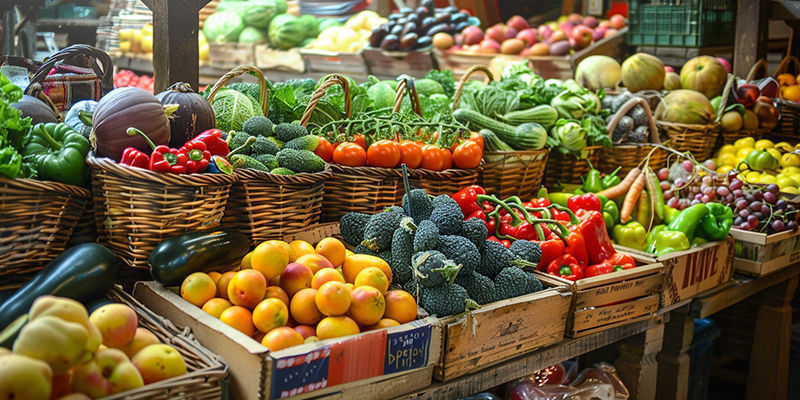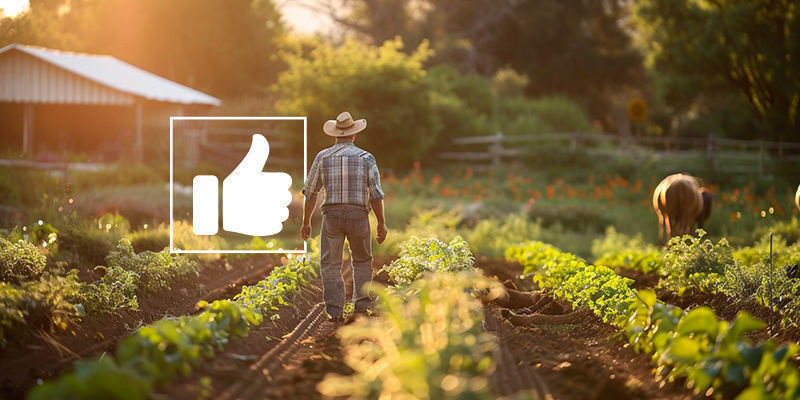
The Transformative Potential Of The Zero-Kilometre Economy
With the world changing, new and innovative solutions are needed to tackle the challenges we face. Some of these are expansive and futuristic, while others might require us to think a little smaller, and a little closer to home. Here we examine the potential of the zero-kilometre economy.
Ever found it strange that your food comes from the other side of the world, when all the land around you seems to be used to grow crops? Well, though it might give us access to a cheaper and wider range of food, this shipping of foodstuffs from all over the globe comes with a whole heap of downsides. From environmental destruction, to slave labour, to reduced rates and wages for local producers, to the increasing fragility of food supplies, the global supply chain might look good from a money-focused consumer point of view, but on the whole appears to be a ticking time-bomb.
It may seem idealistic at first, but going local really might be part of the answer. Of course, it’s not going to be as simple as turning to your local, free range, organic farm—as there are a great many people in the world and feeding everyone requires quite some innovation. But localising the supply chain ensures greater stability of food, more control over production and wages, and can be better for the environment. The key is utilising it efficiently. In this article, we explore the idea of the zero-kilometre economy model, and look at how it could make the world a better place.
What is a zero-kilometre economy?

The zero-kilometre concept isn’t new—it originated as part of the “slow food” movement that began in Italy during the 1980s. This movement rejected global food networks, aiming to preserve local farming and traditional cooking. The km 0 economy brings this idea full circle, focusing on minimising the distance between where products are made and where they’re enjoyed.
Despite the name, a km 0 economy actually seeks to source products from within 100km of their consumption.
The benefits of a zero-kilometre economy

There are many potential upsides to a zero-kilometre economy, from environmental benefits through to public health and economic benefits. The key is not to confuse it with illusory notions of perfect little farms with cows happily roaming the woodlands. An efficient local economy still needs to embrace all the newest technologies and innovations in order to serve all people, rather than those who can regularly afford their meat grass-fed.
Indeed, a km 0 economy may include a combination of organic produce as well as crops grown in dense hydroponic setups, allowing for cheaper prices. In order for genuinely radical change to occur, we mustn’t get overly romantic! Farming is about feeding people, not fulfilling a rural dream.
The environmental impact of the zero-kilometre economy

The zero-kilometre economy has obvious environmental benefits. First and foremost, it reduces the distance products have to travel, thereby cutting carbon emissions. Were this to be replicated across the world, the impact could be significant.
Second, and this is more speculative, it’s likely that if production became more localised, it may be practised in a more ecologically friendly manner, and in such a way that benefits all involved.
Third, km 0 principles align with the principles of a circular economy—that is, an economy that seeks to minimise waste and reuse resources and materials. As all produce would remain within a small vicinity, it would be easier to recollect packaging, transport goods without smothering them in plastic, and collect used goods for recycling.
The role of local agriculture in a zero-kilometre economy
A km 0 economy would increase local enterprise and favour smaller business models—especially in the agricultural sector. Now, this is where it’s most important not to get too idealistic. It’s easy to buy into words like “organic” and assume this is always best, but there is compelling evidence to suggest this is not the case, so we should be pragmatic.
Instead, favouring innovative local businesses will help to grow local economies, reduce the inequality gap between rural and urban centres, and also help to spread different demographics out across an entire nation, rather than centering them in one or two metropolitan hubs. Local economies help to push back the tide of monopolisation, which would benefit all but a very few elites.
Is the zero-kilometre economy a one-size-fits-all solution?
Not at all. It’s part of a much wider network of solutions to a host of global issues. Becoming too misty-eyed about localisation can oversimplify global problems that require global solutions, and detract from the sort of abstract and radical thinking necessary to find such solutions.
Huge populations require a range of sources if they are to be adequately supplied with food and goods. It’s easy to imagine rural villages getting all their supplies from within 100km, but much harder with a city of 10 million inhabitants. What’s more, the benefits of local production need to be weighed up against the destructive realities of spreading industry out across the entire world. Though transporting goods is damaging, so too would be creating farms and factories everywhere—concentrating industry can also have its benefits.
Rather, the concept of a km 0 economy is a useful thought experiment against which we can judge our current means of production and consumption. We should ask ourselves, where and when would it be better to source locally, and when would it be better to source from further away?
It can also tell us something about the nature of global neoliberalism, which is skewed in favour of cheap goods and cheap labour, no matter what the environmental, social, or even economic cost. Making everything as cheap as possible may at first sight appear a good idea, but really it just drives everyone’s wages down, while the few owners reap the rewards of monopolisation.
A zero-kilometre future?

As communities, we need to come together to decide what we should source locally, why we should do this, and how we’ll go about it. Only through educating ourselves about the complex and exploitative nature of contemporary farming and production processes can we make informed decisions about how to improve the state of affairs.
To have relevance, a zero-kilometre economic concept must be much more than a middle-class dream of eating eggs from hens running around in a nearby field. Rather, it should be a sophisticated attempt to restructure economies and supply chains so that they work in favour of the majority of people and the environment, rather than seeking to maximise profit at all costs.
-
 4 min
June 4, 2024
Zamnesia Answers The Web's Most Searched Cannabis...
Discover the answers to some of the most searched cannabis questions on the web. From the uses and effects of cannabis to the latest in weed research, the tallest cannabis plant, and more, we offer...
4 min
June 4, 2024
Zamnesia Answers The Web's Most Searched Cannabis...
Discover the answers to some of the most searched cannabis questions on the web. From the uses and effects of cannabis to the latest in weed research, the tallest cannabis plant, and more, we offer...
-
 5 min
March 28, 2024
Cannabis Careers Explained
With cannabis legalization reaching the tipping point, it’s a good moment to think about careers in the industry. It doesn’t need to be growing or selling - there are many other opportunities...
5 min
March 28, 2024
Cannabis Careers Explained
With cannabis legalization reaching the tipping point, it’s a good moment to think about careers in the industry. It doesn’t need to be growing or selling - there are many other opportunities...
-
 4 min
January 31, 2021
What Is Cannabis?
Sometimes we get so wrapped up in what strain to buy that we forget about the fundamentals of cannabis. Fortunately, we've put together the ultimate beginner's guide. So, whether you're a novice or...
4 min
January 31, 2021
What Is Cannabis?
Sometimes we get so wrapped up in what strain to buy that we forget about the fundamentals of cannabis. Fortunately, we've put together the ultimate beginner's guide. So, whether you're a novice or...
-
 2 min
May 1, 2020
How To Stay Up-To-Date With The Cannabis Industry
The cannabis industry is always changing. Here's how to stay up-to-date on all things cannabis.
2 min
May 1, 2020
How To Stay Up-To-Date With The Cannabis Industry
The cannabis industry is always changing. Here's how to stay up-to-date on all things cannabis.











 United States
United States








